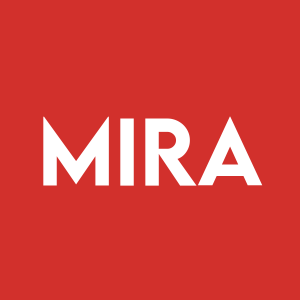Welcome to our dedicated page for Mira Pharma news (Ticker: MIRA), a resource for investors and traders seeking the latest updates and insights on Mira Pharma stock.
MIRA Pharmaceuticals, Inc. (NASDAQ: MIRA) generates a steady flow of news as a clinical-stage biopharmaceutical company advancing oral and topical therapies for neurologic, neuropsychiatric, metabolic, and pain-related disorders. Company press releases and Form 8-K filings highlight progress across its pipeline, including Ketamir-2 for neuropathic pain and CNS indications, MIRA-55 for chronic inflammatory and nociceptive pain, and SKNY-1 for obesity and nicotine addiction following the acquisition of SKNY Pharmaceuticals.
On this news page, readers can follow updates on clinical trial milestones for Ketamir-2, such as completion of the single ascending dose Phase 1 study, initiation of the multiple ascending dose phase, and plans for Phase 2a evaluation in chemotherapy-induced peripheral neuropathy. News items also cover preclinical data releases, including peer-reviewed publications and conference presentations describing Ketamir-2’s performance versus ketamine, gabapentin, and pregabalin in validated neuropathic pain models, as well as topical Ketamir-2 data showing effects comparable to injected morphine in acute and inflammatory pain models.
MIRA’s news flow further includes pipeline expansion and transaction announcements, such as the closing of the SKNY Pharmaceuticals acquisition and new preclinical results for MIRA-55 demonstrating oral pain normalization and inflammation reduction relative to morphine. Corporate and financing updates, including at-the-market equity offerings and Nasdaq listing compliance developments, are also reported through current reports and press releases.
Investors, clinicians, and researchers can use this page to monitor how MIRA’s programs evolve from preclinical studies into human trials, track regulatory milestones like FDA IND clearance, and review strategic decisions that shape the company’s multi-program portfolio in neuropathic pain, chronic inflammatory pain, obesity, addiction, PTSD, and related areas.
MIRA Pharmaceuticals (NASDAQ:MIRA) has announced positive results for its oral ketamine analog Ketamir-2 in a diabetic neuropathy animal model. The study demonstrated significant reduction in neuropathic pain symptoms, with some subjects achieving complete reversal to pre-diabetic baseline sensitivity.
The company is currently conducting a Phase I clinical trial at Hadassah Medical Center, with completion expected in Q4 2025. MIRA plans to initiate a Phase IIa trial in diabetic neuropathy patients by year-end, with first human efficacy data expected in H1 2026.
Ketamir-2 has shown superior performance compared to FDA-approved medications like pregabalin and gabapentin in preclinical studies. Unlike traditional ketamine, it doesn't cause dissociative effects and offers better blood-brain barrier penetration. The company is also developing a topical slow-release formulation and exploring applications for PTSD treatment.
MIRA Pharmaceuticals (NASDAQ:MIRA) has initiated its Phase 1 clinical trial of Ketamir-2, enrolling the first subjects at Hadassah Medical Center in Jerusalem. The trial will evaluate this novel oral ketamine analog for neuropathic pain treatment across 56 subjects in Single and Multiple Ascending Dose cohorts.
Preclinical data showed Ketamir-2's superior efficacy compared to pregabalin and gabapentin, with strong safety profile and oral bioavailability, without ketamine's typical dissociative effects. The Phase 1 study is expected to complete by Q4 2025, followed by a Phase 2a trial in diabetic neuropathic pain patients.
MIRA is also developing a topical Ketamir-2 formulation and advancing the acquisition of SKNY Pharmaceuticals, which includes a $5 million capital infusion. The acquisition brings SKNY-1, a non-GLP-1 oral therapy for weight loss and smoking cessation, into MIRA's pipeline.
MIRA Pharmaceuticals (NASDAQ:MIRA) has signed a binding letter of intent to acquire SKNY Pharmaceuticals, securing a $5 million capital infusion. The acquisition includes SKNY-1, a preclinical-stage oral drug candidate targeting weight loss and smoking cessation.
The transaction will be executed through a stock exchange, with SKNY shareholders receiving MIRA common stock at a valuation determined by an independent third-party firm. The deal positions MIRA in two significant markets: the weight loss drug market, projected to exceed $150 billion by early 2030s, and the smoking cessation market, expected to reach $51 billion by 2030.
SKNY-1 is being developed to interact with cannabinoid receptors CB1 and CB2 pathways for appetite, metabolism, and energy balance regulation. The drug aims to address limitations of current treatments, including severe side effects and the need for lifelong injections in existing weight loss medications.
The transaction is subject to a 90-day due diligence period, regulatory approvals, and board approvals.
MIRA Pharmaceuticals (NASDAQ:MIRA) has successfully developed a topical formulation of Ketamir-2 for localized neuropathic and inflammatory pain treatment, expanding beyond its existing oral formulation. The topical treatment is designed for slow release, providing targeted pain relief while minimizing systemic exposure and side effects.
The new formulation targets multiple conditions including:
- Neuropathic pain conditions (diabetic neuropathy, postherpetic neuralgia)
- Inflammatory pain conditions (osteoarthritis, rheumatoid arthritis)
- Nerve compression & musculoskeletal pain
MIRA's clinical progress includes:
- Ongoing Phase 1 trial for oral Ketamir-2
- Preclinical PTSD studies
- Planned Phase 2a study for diabetic neuropathy by year-end
- Animal study for topical Ketamir-2
- MIRA-55 preclinical studies for memory enhancement
MIRA Pharmaceuticals (NASDAQ:MIRA) has received approval to initiate Phase 1 clinical trials for Ketamir-2, their novel oral ketamine analog for neuropathic pain treatment. The trial, authorized by the Israeli Ministry of Health, will be conducted at Hadassah Medical Center in Jerusalem.
The study includes two parts: a Single Ascending Dose (SAD) with 32 participants and Multiple Ascending Dose (MAD) with 24 participants. The trial aims to evaluate safety, tolerability, and pharmacokinetics, with completion expected by Q4 2025.
Preclinical studies showed Ketamir-2's superior efficacy compared to existing treatments:
- Full pain reversal in nerve ligation models
- 60% more effective than gabapentin in chemotherapy-induced neuropathy
- Enhanced bioavailability through Pamoate salt formulation
- Improved safety profile with no cardiovascular concerns
The neuropathic pain market is projected to reach $5.2 billion in North America by 2030. The company plans to initiate Phase 2a studies in Q4 2025.
MIRA Pharmaceuticals (NASDAQ:MIRA) has submitted an Investigational New Drug (IND) application to the FDA for Ketamir-2, its novel oral ketamine analog for treating neuropathic pain. The submission includes comprehensive data on pharmacology, pharmacokinetics, and toxicology, along with in vitro and in vivo study results.
The North American neuropathic pain market is valued at $3.1 billion with expected growth to $4.5 billion by 2030. Ketamir-2 addresses limitations of existing treatments through selective NMDA receptor targeting, showing 100% pain reversal in preclinical studies without psychotropic effects. The company plans to initiate Phase I Clinical Trials in Q1 2025, followed by Phase IIa trials in late 2025.
MIRA Pharmaceuticals (NASDAQ:MIRA) announces successful completion of Good Laboratory Practice preclinical safety program for Ketamir-2, their novel oral ketamine analog. The studies showed no adverse findings across multiple safety assessments, including cardiovascular safety in dogs, CNS assessment in rats, and respiratory safety tests.
The company plans to submit an Investigational New Drug (IND) application by end of 2024, with Phase I clinical trials scheduled to begin in Q1 2025. The trial design includes pain tests to evaluate effects on neuropathic pain and psychosis, with data expected by Q2 2025. A Phase IIa proof-of-concept study is planned for Q4 2025, with results anticipated by year-end.
MIRA Pharmaceuticals (NASDAQ:MIRA) has selected The Centre for Human Drug Research (CHDR) in Leiden, Netherlands, for its Phase I/IIa clinical trial of Ketamir-2, a novel oral ketamine analog. The trial will begin recruitment in Q1 2025, with Phase I results expected in H2 2025 and Phase IIa results in H1 2026. The study will utilize CHDR's proprietary PainCart technology to measure pain response in healthy subjects during Phase I, followed by testing in diabetic neuropathy patients in Phase IIa. The trial is designed as a randomized, double-blind, placebo-controlled study. Ketamir-2 has shown superior efficacy compared to pregabalin and gabapentin in preclinical studies, with no reported side effects to date.
MIRA Pharmaceuticals (NASDAQ:MIRA) announces that its novel oral ketamine analog Ketamir-2 shows 60% greater efficacy than FDA-approved gabapentin in treating chemotherapy-induced neuropathic pain in preclinical studies. Using the paclitaxel model, Ketamir-2 achieved near-complete pain normalization at 300 mg/kg dose. The company plans to submit an IND application by end of 2024 and begin Phase I trials in Q1 2025. MIRA is also evaluating Ketamir-2 for diabetic neuropathy, PTSD, and other conditions. The drug could potentially qualify for FDA breakthrough therapy designation, fast track, and priority review for treating rare cancer-related neuropathic pain.
MIRA Pharmaceuticals (NASDAQ:MIRA) announces that its novel oral ketamine analog, Ketamir-2, outperforms FDA-approved neuropathic pain treatments Gabapentin and Pregabalin in preclinical studies. Key findings show Ketamir-2 provided up to 112% more effective results than Pregabalin and 70% greater relief than Gabapentin at higher doses by Day 22 in female rats.
Ketamir-2 offers advantages over current treatments, including being non-habit forming and potentially avoiding sedation and cognitive impairment. MIRA is preparing to submit an Investigational New Drug (IND) application by year-end, with Phase 1 clinical trials scheduled for Q1 2025 and Phase 2 trials in Q4 2025. The company is also exploring Ketamir-2's potential for PTSD treatment and pursuing government grants to accelerate development.


